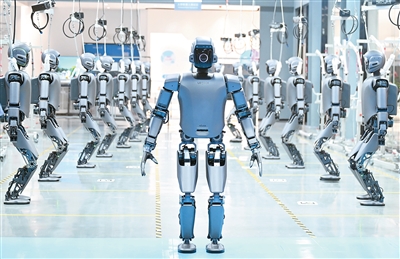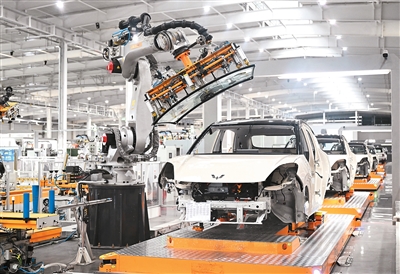




- BRNN
- BRI News
- BRNN News
- Database
Official Documents Polices and Regulations
Inter-government Documents International Cooperation BRI Countries
Business Guide Economic Data BRI Data
Trade
Investment Projects Latest projects
Cases - Content Pool

Photo shows the first industrial humanoid robot manufactured in south China's Guangxi Zhuang Autonomous Region at the Robot Industrial Park in the northern ecological new area of Liuzhou, June 18, 2025. (Photo/Li Hanchi)
Since the beginning of this year, artificial intelligence (AI) has been injecting fresh vitality into the manufacturing sector in Liuzhou, south China's Guangxi Zhuang Autonomous Region.
From January to July, the output value of AI products in Liuzhou reached 8.87 billion yuan (about $1.25 billion), with intelligent terminals and robots accounting for 5.7 billion yuan, up 23.7 percent year on year.
At the Liuzhou smart factory of UBTECH, a leading robotics company, its first industrial humanoid robot, WalkerS1, rolled off the production line and has since been deployed at Dongfeng Liuzhou Motor Co., Ltd. Meanwhile, Guangxi Automobile Group has unveiled an intelligent mobile energy storage charging vehicle with Level 4 autonomous driving capabilities.
Liuzhou has now developed an annual production capacity of 20,000 intelligent service robots, forming a robust robot industry system and a smart terminal equipment industrial cluster encompassing six product series and more than 50 models.
Liuzhou's strong industrial foundation—anchored in its thriving automobile, machinery, and steel sectors—provides fertile ground for AI applications.
"Liuzhou offers rich application scenarios and strong market demand, which attract companies capable of developing and implementing AI-driven solutions. AI facilitates the intelligent transformation of traditional industries," said Mo Chunyan, deputy director of Liuzhou's municipal bureau of industry and information technology.
Currently, Liuzhou is pursuing deep integration of AI and manufacturing as its main development strategy. Liuzhou's status as a national pilot city has enabled it to guide 435 small- and medium-sized enterprises through digital upgrades. The companies, spanning the automotive, steel and construction machinery sectors, have adopted AI and advanced technologies to modernize their operations.

Photo shows an automated production line of an intelligent plant of SAIC-GM-Wuling in Liuzhou, south China's Guangxi Zhuang Autonomous Region, Sept. 9, 2025. (Photo/Li Hanchi)
Liuzhou has focused on intelligent connectivity and green low-carbon technology as key automotive industry priorities during the current Five-Year Plan period (2021-2025), said Guan Weirong, director of the Liuzhou municipal science and technology bureau.
Guan added that the city is prioritizing support for local enterprises working to break through key technologies in intelligent connected vehicles and advance product intelligence.
Chinese automaker SAIC-GM-Wuling (SGMW) and tech giant Huawei Technologies held a signing ceremony on Sept. 6 in Liuzhou, to deepen their cooperation around SGMW's Baojun brand.
"We have built a comprehensive AI ecosystem that spans intelligent R&D, autonomous driving, smart manufacturing, digital supply chains, and intelligent marketing," said He Yibo, vice general manager of SGMW.
The rapid development of AI in Liuzhou owes much to science-based policymaking by the local government.
To foster industrial growth, Liuzhou has set up a dedicated AI development working group and an AI industry task force, introducing a working mechanism for projects in key sectors and advancing more than 60 projects.
The city has also introduced several key policy measures, including guidelines for promoting AI development, nine targeted policies to support the intelligent terminal and robotics industries, and the "AI Plus Manufacturing" action plan, which outlines six major initiatives aimed at driving AI-related industrial output beyond 50 billion yuan by 2027. Liuzhou is the first city in Guangxi to issue such an action plan.
In April, Liuzhou held a conference on AI-driven transformation and upgrading of traditional industries, bringing together experts and scholars from national-level institutions, and entrepreneurs for high-level cross-sector exchanges. At the event, the city signed strategic cooperation agreements with multiple enterprises, including 43 concentrated projects worth a total investment of 33.77 billion yuan, injecting strong momentum into the city's industrial development.
Liuzhou has developed an "AI Plus" ecosystem combining intelligent manufacturing with practical applications. The city houses 42 robot and intelligent terminal manufacturers, 12 provincial benchmark intelligent manufacturing companies, 75 smart factories and 62 digital workshops.
Looking ahead, Liuzhou plans to establish more than 100 demonstration application scenarios for terminal products in emerging industries across the city within the next five years, said Wang Ying, director of the city's municipal development and reform commission.

Tel:86-10-65363107, 86-10-65368220, 86-10-65363106